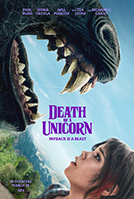Death Of A Unicorn

| Original title: | Death Of A Unicorn |
| Director: | Alex Scharfman |
| Release: | Cinema |
| Running time: | 107 minutes |
| Release date: | 28 march 2025 |
| Rating: |
Mulder's Review
At a time when hybrid cinema often settles into predictable rhythms, Alex Scharfman's Death of a Unicorn is an eccentric and thrilling breath of fresh air, blending sharp social satire and elements of horror to create a captivating modern parable. Backed by a strong cast, including Jenna Ortega, this film is an unapologetic and delightfully absurd exploration of humanity's greed and pride, cleverly disguised under a fantastical and horrific veneer. While the film's central concept—murderous unicorns wreaking havoc on the estate of an unscrupulous billionaire—could easily descend into kitsch, director and screenwriter Alex Scharfman manages to ground his daring premise in a powerful combination of sharp humor, poignant family drama, and thrills.
At the heart of Death of a Unicorn is Elliot Kintner, played with sincerity by Paul Rudd, a pharmaceutical lawyer desperately seeking to secure his financial future by getting closer to his dying billionaire boss, Odell Leopold, played by the charismatic Richard E. Grant. Yet despite Paul Rudd's usual charming presence, it is Jenna Ortega who transcends the screen with her revealing portrayal of Ridley, Elliot's grieving daughter. Jenna Ortega, who is fast becoming one of the most fascinating young actresses of her generation, brings depth to Ridley, transforming what could have been a moody, clichéd teenager into a complex and moving character. From her knowledge of art history to her poignant memories of unicorn tapestries at the Cloisters, Jenna Ortega delivers a remarkably nuanced performance, infusing the film with a welcome sincerity amid its often joyful absurdity.
Jenna Ortega's character serves as the film's moral compass. Her intuitive skepticism contrasts sharply with the Leopolds' unbridled greed, whose first reaction to discovering an injured unicorn is not wonder or compassion, but exploitation for profit. One can't help but draw parallels to real-life pharmaceutical controversies, particularly when remembering the infamous Sackler family. The Leopolds—played with delicious arrogance by Richard E. Grant, the ever-graceful Téa Leoni as Belinda, his superficially philanthropic wife, and Will Poulter, who steals the show as Shepard, their disastrously privileged son—offer a scathing commentary on unbridled capitalism, perfectly summed up in the hysterical and indulgent sequence where Will Poulter snorts unicorn horn powder in a reckless display of his privilege. Will Poulter's energetic performance highlights the grotesque absurdity of the upper class, echoing the satirical depth reminiscent of Ruben Östlund's Triangle of Sadness or even Bong Joon-ho's acclaimed Parasite.
Yet despite its powerful satire and humor, the film maintains a dynamic tension thanks to Alex Scharfman's clear reverence for cinema classics such as Spielberg's Jurassic Park and John Carpenter's horror repertoire. While some of the special effects, particularly in the first act, seem surprisingly uneven—inviting an unfortunate but inevitable comparison to the timeless practical effects of Jurassic Park—the tangible puppets used in key scenes add a tactile reality to the unicorns' savage revenge. Alex Scharfman skillfully blends this ferocity with humor, creating scenes that perfectly balance horror and humor, a feat that many seasoned filmmakers would envy.
The playful subversion of the unicorn myth in this film deserves special mention. Rather than gentle, ethereal beings, Alex Scharfman depicts these creatures as monstrous beasts from ancient lore, majestic but undeniably deadly. As Ridley diligently unravels the historical fabric of unicorn mythology, she uncovers stories that portray these creatures less as innocent wonders and more as fierce protectors of natural purity. Here, the script cleverly uses historical and artistic references, drawing on Ridley's studies to create a compelling subplot that deepens the audience's engagement and presents unicorns as both literal and symbolic instruments of nature's fury against human exploitation.
Despite these considerable strengths, Death of a Unicorn occasionally stumbles. Some emotional threads, particularly those revolving around grief and the strained family ties between Elliot and Ridley, feel underdeveloped. The desire for emotional resonance is palpable, but the film sometimes resorts to superficial sentimentality that diminishes its potential impact. Furthermore, the unevenness of the CGI in the early acts risks alienating viewers accustomed to polished visuals, reminding us that even innovative storytelling can fail due to technical imperfections.
However, these few flaws do little to detract from the film's overall charm. Jenna Ortega's remarkable presence continues to anchor the story, bringing an emotional sincerity that bridges the film's tonal shifts. Her final scenes with Paul Rudd, while perhaps lacking the careful construction they deserved, nevertheless offer moments of reconciliation and genuine tenderness, testifying to the chemistry between the actors and their commitment to remaining authentic amid the fantastical chaos.
Death of a Unicorn stands out as a unique and enjoyable cinematic experience, halfway between social commentary and monster movie, and totally original. It's rare to see a film that so openly embraces its absurdity while managing to deliver thrills and incisive commentary. Jenna Ortega's captivating performance, rich in emotional subtleties and charm, elevates the film even further, confirming her status as one of the most intriguing talents of her generation. Despite its flaws, Alex Scharfman's debut film is an undeniable success that reminds audiences of cinema's infinite capacity to surprise and delight, deserving enthusiastic applause—and perhaps cautious respect—for its unapologetic embrace of unicorn-fueled carnage.
Death of a Unicorn
Written and directed by Alex Scharfman
Produced by Lucas Joaquin, Tyler Campellone, Drew Houpt, Lars Knudsen, Alex Scharfman, Tim Headington, Theresa Steele Page
Starring Paul Rudd, Jenna Ortega, Will Poulter, Téa Leoni, Richard E. Grant
Cinematography: Larry Fong
Edited by Ron Dulin
Music by Dan Romer, Giosuè Greco
Production companies: Secret Engine, Monoceros Media, Square Peg, The Royal Budapest Film Co, Ley Line Entertainment
Distributed by A24 (United States)
Release dates: March 8, 2025 (SXSW), March 28, 2025 (United States)
Running time: 107 minutes
Seen on April 29, 2025 (VOD)
Mulder's Mark:

